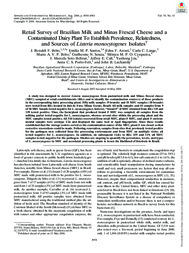Retail survey of Brazilian milk and minas frescal cheese and a contaminated dairy plant to establish prevalence, relatedness, and sources of listeria monocytogenes isolates.
Retail survey of Brazilian milk and minas frescal cheese and a contaminated dairy plant to establish prevalence, relatedness, and sources of listeria monocytogenes isolates.
Autoria: BRITO, J. R. F.; SANTOS, E. M. P.; ARCURI, E. F.; LANGE, C. C.; BRITO, M. A. V. P.; SOUZA, G. N.; CERQUEIRA, M. M. O. P.; BELTRAN, J. M. S.; CALL, J. E.; LIU, Y.; PORTO-FETT, A. C. S.; LUCHANSKY, J. B.
Resumo: A study was designed to recover Listeria monocytogenes from pasteurized milk and Minas frescal cheese (MFC) sampled at retail establishments (REs) and to identify the contamination source(s) of these products in the corresponding dairy processing plant. Fifty milk samples (9 brands) and 55 MFC samples (10 brands) were tested from REs located in Juiz de Fora, Minas Gerais, Brazil. All milk samples and 45 samples from 9 of 10 MFC brands tested negative for L. monocytogenes; however, “brand F” of MFC obtained from REs 119 and 159 tested positive. Thus, the farm/plant that produced brand F MFC was sampled; all samples from the milking parlor tested negative for L. monocytogenes, whereas several sites within the processing plant and the MFC samples tested positive. All 344 isolates recovered from retail MFC, plant F MFC, and plant F environmental samples were serotype 1/2a and displayed the same AscI or ApaI fingerprints. Since these results established that the storage coolers served as the contamination source of the MFC, plant F was closed so that corrective renovations could be made. Following renovation, samples from sites that previously tested positive for the pathogen were collected from the processing environment and from MFC on multiple visits; all tested negative for L. monocytogenes. In addition, on subsequent visits to REs 159 and 119, all MFC samples tested negative for the pathogen. Studies are ongoing to quantify the prevalence, levels, and types of L. monocytogenes in MFC and associated processing plants to lessen the likelihood of listeriosis in Brazil.
Ano de publicação: 2008
Tipo de publicação: Artigo de periódico
Unidade: Embrapa Gado de Leite
Palavras-chave: Contamination sources, Minas frescal cheese, pasteurized milk
Observações
1 - Por padrão são exibidas publicações dos últimos 20 anos. Para encontrar publicações mais antigas, configure o filtro ano de publicação, colocando o ano a partir do qual você deseja encontrar publicações. O filtro está na coluna da esquerda na busca acima.
2 - Para ler algumas publicações da Embrapa (apenas as que estão em formato ePub), é necessário ter, no celular ou computador, um desses softwares gratuitos. Sistemas Android: Google Play Livros; IOS: iBooks; Windows e Linux: software Calibre.
Acesse outras publicações
Acesse a Base de Dados da Pesquisa Agropecuária (BDPA) para consultar o acervo completo das bibliotecas da Embrapa.

